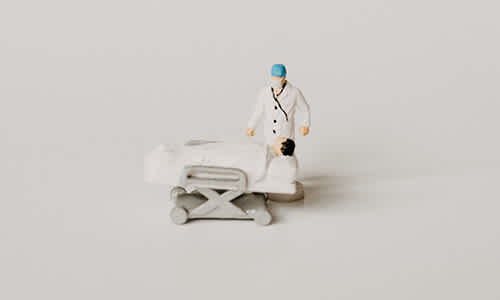How to financially handle unexpected illness or injury

Receiving an unexpected diagnosis of an illness, or seriously injuring yourself, can take a toll on your finances. It can also be really taxing emotionally.
But, there are a few things you can do to financially handle unexpected medical expenses.
Here's what you can do before you receive a medical bill
While the whole point of an unexpected bill is that it's just that - unexpected - the best thing to do is to always plan for the unexpected.
That means having a healthy savings balance, and being aware of some basic questions to ask your doctor before any medical procedure takes place.
Save an emergency fund
An emergency fund is something that you save outside of your regular savings account, so you can be prepared for unexpected car repairs, medical bills or simply to get yourself out of a tough situation.
This is your financial safety net. It means you don't need to borrow money from others in the event that you need it.
Even if you're focused on a different savings goal, like a house deposit, you can still contribute small amounts - even $20 a week - into your emergency fund. The Government's MoneySmart site says a good emergency fund should have enough money to cover three months' worth of expenses.
Ask questions
Even if you have an emergency fund, a good way to ensure you're prepared for the medical costs of a procedure is to ask your doctor or their staff some questions beforehand.
The Ombudsman suggests you ask some fact-finding questions, like:
- What are the Medicare Benefits Schedule (MBS) item numbers for the services the doctor is going to perform and what will be the charge for each of these services?
- How will the doctor bill me?
- When will I need to pay?
- Who are the other doctors treating me during the admission, and how can I get an estimate on their fees?
Check your health cover
Once you get an idea of how much your medical bill will be, and when you'll be required to pay it, you should then contact your health insurer (if you have one) to ask about any benefits you're entitled to.
If you're a private patient having in-hospital treatment, Medicare will pay 75% of the MBS fee for each MBS item provided as part of your treatment. Your health insurer will pay the additional 25% if you're covered by those benefits.
However, you can contact Medicare to confirm the amount they'll pay for the medical services provided if necessary.
Here's what you can do after you've received a medical bill
We know hindsight is always better than foresight. If you've received a higher than expected medical bill, there are things you can do at that stage to soften the financial burden.
Talk to your doctor
If the cost is much higher than you expected, the Ombudsman suggests you pay at least part of the bill - the part you were expecting to pay. When you make the payment, give your doctor a letter outlining why you're only part-paying the bill. Ask the doctor what the extra charges were for, and why you weren't told about them.
From there, you and your doctor can enter into negotiations about the cost of your medical procedure, and try to come to an arrangement that suits both of you. Alternatively, contact your private health insurer, and they may be able to advocate on your behalf.
If you can't cover the medical bill, you may want to contact your doctor's office as soon as possible to let them know. They may opt to provide you with a negotiated fee or a payment plan.
Contact the health complaints agency in your state
If you can't come to an agreement with your doctor over the costs of your procedure, you can contact the health complaints agency in your state or territory.
Apply for a medical loan
Medical loans are personal loans that can be taken out and used for medical expenses, like surgical procedures or dentistry. These can be a good option for particularly large - and unexpected - medical costs.
The main benefit to a medical loan is that you can access potentially life-changing medical services pretty much immediately, rather than waiting until you have enough money to pay for it. This is a really important consideration.
Where can I get a medical loan?
Medical loans are offered by most lenders, including SocietyOne, as they are simply a form of a personal loan.
Things to consider when searching for a medical loan
Like all loans, one of the most important considerations is the interest rate. Personal loan interest rates can range from 6% to 20% - or more - so you need to do your research. Use comparison sites to determine which rate is right for you.
You'll need to make sure your credit score is healthy before you apply for a loan. While it's not the only thing lenders take into consideration when deciding whether to approve your finance or not, it allows you to get a sense of how lenders perceive you. This means you're more prepared for when lenders ask you questions about your credit history.
Remember that taking out a loan can extend the lifespan of your debt, so ensure this is the right option for you before choosing to do it.
It's also important to remember that taking out a personal loan leaves an immediate mark on your credit history. And, if you can't meet repayments on time, your credit score will be negatively affected.
You can easily check your credit score for free here at SocietyOne. Our credit score report will provide you with powerful insights, to see how banks and lenders view your score.
You'll also gain access to nifty tips and tricks on how to improve your score. Check your score here!
You may also like
News, tips and offers straight to your inbox.


